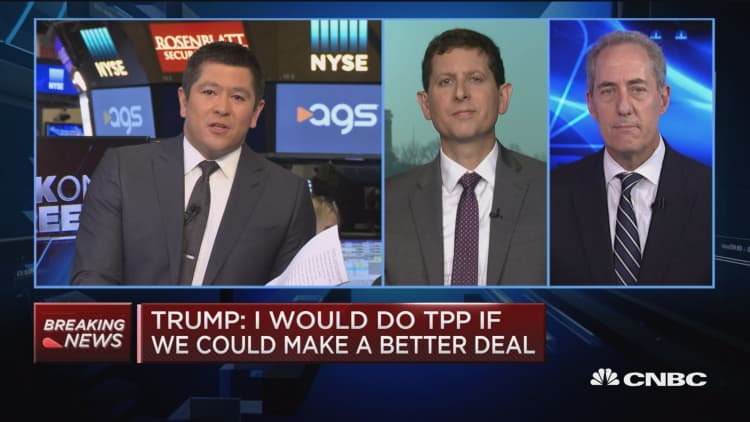
Withdrawing from the 12-nation Trans-Pacific Partnership was one of President Donald Trump's first moves in office.
The deal had been cast aside by Congress and had been, politically, left for dead.
In an interview with CNBC in Davos on Thursday, Trump recast his expectations, saying he would considering rejoining if he were granted a "substantially better deal." (No word on what "better" deal would mean.)
Before Trump's potential change of heart, the 11 other TPP countries had decided to move on without the United States — formally agreeing to a new deal on Tuesday — exactly one year after the U.S. withdrawal — and planning a signing ceremony for March 8 in Chile.
"Our allies and partners would welcome re-engagement by the U.S. in working on the issues addressed by TPP, many of which the president has focused on in dealing with China," said Michael Froman, the U.S. trade representative for President Barack Obama and chief negotiator for the original 12-nation deal. "The TPP-11 have moved on to put the agreement in place without the U.S., more in sorrow than in anger."
So would it be possible for the United States to rejoin? The answer is yes — depending on what the U.S. would ask for.
Australian Prime Minister Malcolm Turnbull, who is expected to visit the White House in February, told reporters this week that potential membership changes were built into the deal's structure.
"It's been set up on the basis that it is a trade deal that can admit new members, or even re-admit a member like the United States, that chose to pull out," Turnbull told reporters at a "doorstop" event in Canberra the day after the new deal was announced.
"But I don't expect the United States to join the TPP any time soon. We're certainly not counting on it."
Consensus from all 11 members would be required were the U.S. to join the deal as a new member, or make any changes to the treaty's substance, according to one trade official.
In addition to Australia and Chile, the other countries in the pact are Brunei, Canada, Japan, Malaysia, Mexico, New Zealand, Peru, Singapore and Vietnam.
"As a technical matter, it wouldn't be too difficult," says Bruce Hirsh, founder of Tailwind Strategies and former trade official during the Clinton, Bush and Obama administrations. "The real difficulty would lie in what [Trump] would require to achieve the 'much better deal than we had' with the original TPP."
The new deal carries lots of similarities to the original deal: Requirements for labor, environment and government procurement issues remain. The agreement will drop tariffs to zero on nearly all goods traded in the bloc, including tariffs on motorcycles singled out by Trump as an issue he opposes.
Other sections of particular interest to the U.S. have been suspended, but are already written. Canada secured new protections for its movies, TV and music properties, but one change won't sit well with the United States: Vehicles made in Canada will carry more Chinese auto parts.
The 11 countries in the deal represent 13.5 percent of global gross domestic product — including the United States would bring that total to 38 percent.
"There's no way the other 11 countries wouldn't welcome the United States, because it would be better for them," said Stefan Selig, former under secretary of Commerce for International Trade during the Obama administration. "But I wouldn't read too much into it as a change in administration policy."
Vice President Mike Pence clearly stated the administration's policy during October bilateral trade talks with Japan, which spearheaded the new TPP negotiations in the U.S. absence.
Asked about TPP, Pence called it "a thing of the past for the United States of America," saying the decision to withdraw "will be our policy going forward." During those talks, Japanese Finance Minister Taro Aso stressed the importance of the Trans-Pacific Partnership and Japan's desire for the U.S. to consider rejoining.
The potential expansion isn't limited to the U.S.: Trade officials suggest Thailand, Indonesia, the Philippines, South Korea, Taiwan or the United Kingdom may join future talks.
But international trade officials take Trump's comments with a grain of salt, saying a more realistic outcome, in their view, is for a future U.S. president to reverse its withdrawal.

